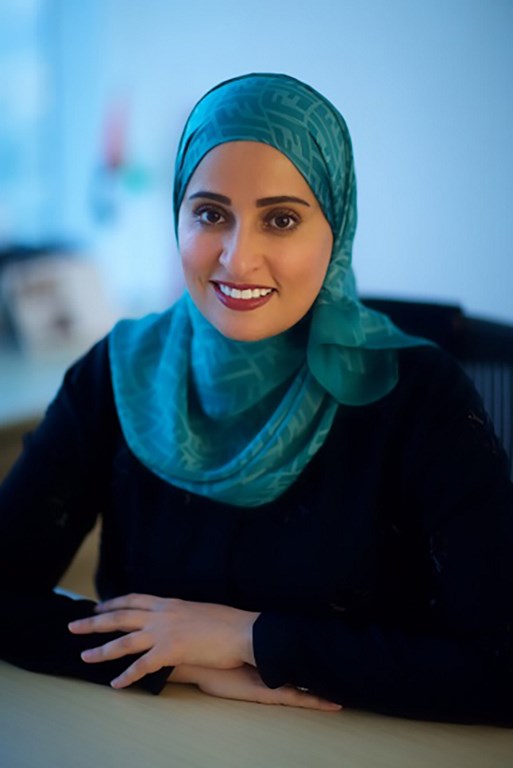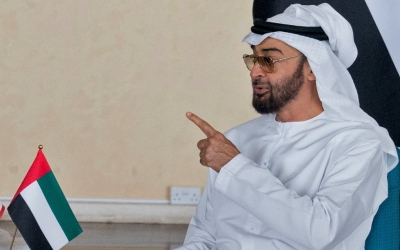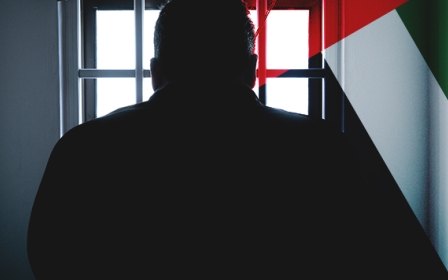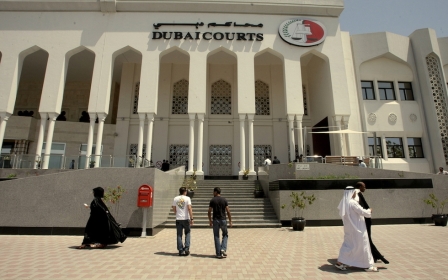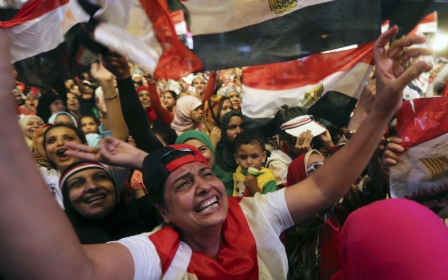UAE: The ‘happiest’ little police state ever?
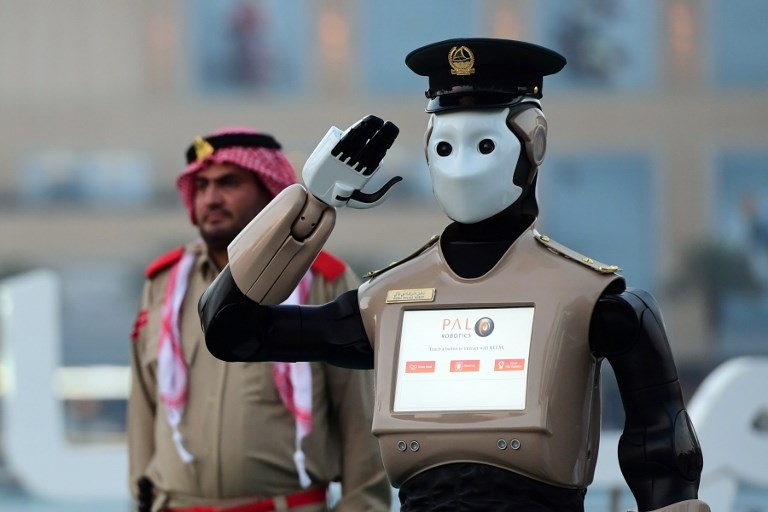
In February, Time Out Dubai ecstatically reported that the United Arab Emirates was "one of the happiest countries in the world", according to a new study by the Boston Consulting Group.
The article's author, Scott Campbell, gushed that the "transformation to happiness" had been "guided by the vision of His Highness Sheikh Mohammed bin Rashid Al Maktoum", who is not only the ruler of the emirate of Dubai but also the vice president and prime minister of the UAE.
Transformative steps have included "adopting a globally unique, science-based programme to analyse happiness levels" and "asking people to rate public services with emoji-style reviews".
Obviously, nothing says genuine human contentment - in an artificial land characterised by soul-crushing materialism and malls with ski slopes - like a digital yellow smiley face.
The happiness mandate
New MEE newsletter: Jerusalem Dispatch
Sign up to get the latest insights and analysis on Israel-Palestine, alongside Turkey Unpacked and other MEE newsletters
This is not the first time that the UAE has turned up on the frontlines of "happiness". In 2018, the World Happiness Report, published by the UN Sustainable Development Solutions Network, ranked the country twentieth among 156 nations and the happiest in the Arab world.
Emirati nationals were furthermore ranked the eleventh-happiest worldwide. So much for that silly old saying that money can’t buy happiness.
Emirati nationals were ranked the eleventh-happiest worldwide. So much for that silly old saying that money can’t buy happiness
In 2016, the UAE appointed a minister of state for happiness - a post that was subsequently upgraded to Minister of State for Happiness and Wellbeing. The online official portal of the UAE government boasts a lengthy section on "happiness", which outlines the aim "to make the country among the top five happiest countries in the world by 2021".
Bombarded with this torrent of information about the National Programme for Happiness and Positivity, the National Charter for Happiness, and the Emirates Center for Happiness Research, one can’t help but long for the rolling-eyes emoji - or, perhaps, the banging-head-against-wall emoticon.
After all, "happy" is a rather ludicrous descriptor for an entity that is so often synonymous with the obliteration of rights. A brief glance at Human Rights Watch’s most recent overview of events in the UAE is enough to confirm that the situation is far from cheery.
Assault on free expression
For example, "UAE residents who have spoken about human rights issues are at serious risk of arbitrary detention, imprisonment, and torture" - part of Emirati authorities’ "sustained assault on freedom of expression and association".
To be sure, the UAE constitutes a land of economic opportunity for many a Western "expat" as well as other privileged sectors of the global populace.
But as HRW notes, "many low-paid migrant workers remain acutely vulnerable to forced labour", and the country’s labour law doesn’t cover domestic workers, “who face a range of abuses, from unpaid wages, confinement to the house, workdays up to 21 hours with no breaks, to physical or sexual assault by employers”.
Over the years, all manner of horror stories involving migrant worker abuse have emerged - including, as it so happens, from the construction of New York University’s oh-so-sophisticated Abu Dhabi campus and the Louvre Abu Dhabi.
Oppressive surveillance landscape
In addition to exploited workers, other foreign nationals might be forgiven for finding the UAE to be a less-than-happy place. Five years ago, my Lebanese friend’s father - who had resided in the Emirates for decades with his wife and whose children were born there - was suddenly given 48 hours to leave the country, with no explanation. Though decidedly apolitical, the father happened to be Shia, which is apparently reason enough to break up UAE-based Lebanese families.
Meanwhile, all inhabitants of the UAE exist in an oppressive landscape of total surveillance. As Middle East Eye noted last year, an Emirati cybercrime law "essentially provide[s] a legal basis to detain anybody who criticises the regime online".
In Abu Dhabi, an "Israeli-installed mass civil surveillance system” known as Falcon Eye reportedly "enables Emirati security officials to monitor every person 'from the moment they leave their doorstep to the moment they return to it'".
But, hey, who said police states aren’t happy?
Nor has the UAE brought much happiness to Yemen, a country whose devastation in recent years is in large part thanks to the criminal excesses of a Saudi- and Emirati-led coalition, which have ranged from slaughtering Yemeni children on a school bus to paving the way for mass starvation.
In a recent investigation for the Guardian on “how the UAE is profiting from the chaos of civil war” in Yemen, Ghaith Abdul-Ahad writes that, while all parties to the conflict are responsible for atrocities, “no one can compete with the detentions, torture and forced disappearances by the Emirati-sponsored troops”. He continues: “An unprecedented campaign of terror followed the formation of these forces in 2016."
And while the ostensible aim of the campaign was to fight al-Qaeda, “the targets expanded to include anyone who dared to oppose the UAE presence in Yemen”.
A useful smokescreen
Fitting, then, that the UAE is a primary “terror-fighting” partner of the US - another nation that regularly engages in terrorism under the guise of fighting it. Of course, the US has also fervently backed Saudi-Emirati horrors in Yemen with weapons and other forms of support.
In 2017, the Associated Press documented at least 18 secret prisons-cum-torture centres in Yemen run by the UAE or UAE-trained forces, where the US was also known to interrogate detainees. The following year, the AP ran a report identifying “at least five [Emirati] prisons where security forces use sexual torture to brutalize and break inmates”.
The country’s portrayal as an ultra-modern oasis of wealth and progress helps conceal its fundamentally anti-human orientation
In the end, the current propaganda promoting the UAE as one of the happiest places on earth is a useful smokescreen for nefarious activity both at home and abroad.
Apparently, the - ultimately empty - concept of "happiness" has been deemed a suitable substitute for freedom, human rights, and all that good stuff, while the country’s portrayal as an ultra-modern oasis of wealth and progress helps conceal its fundamentally anti-human orientation.
And since the Emirati enterprise nicely reinforces a US-led global neoliberal project that prioritises obscene socioeconomic inequality and war - while also conveniently facilitating normalisation with America’s favourite Israeli partner in crime - things will presumably only get happier.
The views expressed in this article belong to the author and do not necessarily reflect the editorial policy of Middle East Eye.
Middle East Eye delivers independent and unrivalled coverage and analysis of the Middle East, North Africa and beyond. To learn more about republishing this content and the associated fees, please fill out this form. More about MEE can be found here.



